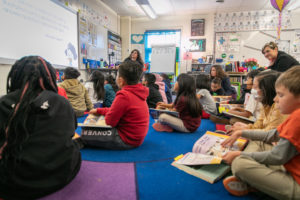This state’s public education achievement crisis, and needed solutions, are documented in a new call-to-action book
With one in three students testing below grade level in reading and math, Kansas public education is embroiled in a chronic achievement crisis – one the system only perpetuates and only parents and…

With one in three students testing below grade level in reading and math, Kansas public education is embroiled in a chronic achievement crisis – one the system only perpetuates and only parents and community leaders can fix.
That’s the message of the new book Giving Kids a Fighting Chance with School Choice – Resolving the Social Justice Issue Perpetuated by Kansas Public Schools, published by the Kansas Policy Institute.
Though already on Amazon.com, with a few extra copies available directly through KPI, an official book launch featuring a live remote appearance by former Florida Gov. Jeb Bush is scheduled for 11-12:30 on Oct. 17 at the Hyatt Regency in Wichita. The public is invited, and registration is available here.
“We just have this huge education crisis, and most Kansans don’t understand it,” says Dave Trabert, Kansas Policy Institute CEO and the book’s co-author with former public school teacher David Dorsey. “They’ve been told it’s money, and they’ve been told that achievement is good.
“For example, the Kansas School Board Association puts out a regular report claiming that Kansas is among the 10 best in the nation for student achievement. That’s just never been true. But that’s the story they tell.”
The stories this book tells are quite different.
“We tell story after story of state and local education officials consciously deceiving legislators and parents – de-emphasizing academics and achievement gains, and even ignoring state laws,” Trabert tells The Lion.
As an example, Trabert notes the Kansas Legislature has provided over $5 billion in incremental funding since 2005 to help academically and financially at-risk students – yet a 2019 state audit found most of the funding was being siphoned off to all students, not just those at-risk as required by law.
“And when that audit came out, the school system didn’t say, ‘Oh gee, we didn’t understand.’ The State Board of Education president wrote an article in the Kansas City Star that basically said shut up, go away, we know what we’re doing. But when you look at the achievement data, arguably they don’t.”
And it’s those minority, disadvantaged and at-risk students who are hurt the most, Trabert says, calling the result “rampant education discrimination.”
“For example, on the ACT, 25% of white students are college-ready in English, reading, math and science – but only 9% of Hispanics and just 5% of black students.”
In what Trabert says is another example of the education bureaucracy defiantly refusing to do its homework as required by law, the Legislature ordered local school boards to annually assess the academic needs of every school, to inform their budget process and improve student achievement. But in a check of 25 of the state’s largest districts, he says, KPI “found that none of those 25 districts were doing what the law intended. In fact, only two of them went through the exercise.
“In fact, some of the information on those reports were horribly inaccurate – saying that, for example, only 4% of the kids were not proficient, when it was more than 10 times that.
“This is just the way the bureaucracy does. Even when the Legislature says you shall do these things, they say, ‘Nah, we don’t want to.’”
Apparently as a result of KPI’s detective work, this year the Legislature was more specific – ordering the education bureaucracy to answer three questions: What are the barriers to achievement gains in each school? What are the budgetary changes required to overcome them? And how many years will it take to get kids to be proficient?
Even so, Trabert says suburban Kansas City’s Blue Valley School District now says it has a one-size-fits-all district-wide goal to get kids to 55% proficiency in math in the current school year – which is neither what the Legislature is asking for nor realistic, he says.
“Well, that says that they didn’t look at the reports at all, because in some cases that would require more than doubling the proficiency rate from 2021,” Trabert says. “It’s just not feasible, and it doesn’t matter because they’re just going through the exercise.
“That’s why this system just isn’t working for students. Its basic focus is to preserve the system, protect the bureaucracy, and nothing is going to get in the way of that bureaucracy doing what it wants.”
What will make a difference, Trabert says, is engaged parents, as well as state and local leaders in both the public and private sectors. To them, he says:
“You need to understand the challenges you’re facing with kids coming to community college or university not prepared. That’s not going to change. If you’re looking for improving a workforce, if you’re concerned about closing income gaps – it’s no surprise that income gaps exist when the school system perpetuates educational discrimination.
“We, for example, have more high school kids below grade level than are proficient. If they don’t find it acceptable that looking at all kids tested, a third of them are below grade level in Kansas … then they have to understand that they need to do something.
“It’s like Gandhi said: You have to be the change you want to see. Because if you don’t get involved and push for change, then change won’t happen.”
This is a particularly opportune moment for engagement, now that parents and others around the nation have become familiar with outrageous sexual and racial indoctrination in many schools. They need to pay attention to achievement too, Trabert says.
“We had a lot of parents come to [KPI] because we have the litigation division, because we have the media division, looking for help during the pandemic. And we were happy to help. One of the things we told them every time is, look, you need to understand that once your kids get back into school and things get back to so-called normal, you need to understand what they’re going back to.
“The way that most school districts handled the pandemic perversely helped kids, because they helped parents understand what’s really going on behind the scenes. They helped them understand what they didn’t know – and that was kind of a general attitude of adults first, students second.”
Trabert went to great lengths to emphasize to The Lion that this is not a teacher problem.
“This is a management problem,” he said. “If teachers were in charge of the system, I dare say it’d be an entirely different system. We know that there are a lot of teachers and principals who are pretty frustrated with the way the system operates. But they’re terrified to say anything for fear of losing their job.
“So, it gets off track because it’s a bureaucracy and bureaucracies can get off track, especially when it’s a monopoly. The education system – and again, these are state and local officials; it’s school board members, it’s superintendents, it’s Department of Education officials – the approach, their attitude, is that the kids kind of belong to them.
“And that’s really starting to creep in when you start looking at how they want to take over what they call ‘the whole student.’ They won’t admit that they’ve de-emphasized academics, but if you look at everything they do, that’s what’s happening.”
There is no one solution to this problem, but as the book title suggests, school choice is a huge portal to solving the student achievement crisis, Trabert says.
“Choice is a big component, and we base that on looking at what states like Florida and Arizona have done. Those are probably the two states with the most robust school choice options. And in the case of Florida, they’ve also layered in a lot of transparency and accountability.”
Kansas Policy Institute is certainly for that – and so are growing numbers of parents and leaders.



